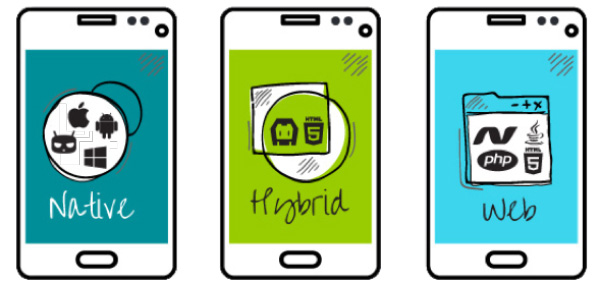A breakdown of the 3 types of mobile apps and a list of the best cross platforms to use in mobile app development
Smartphones have become an inseparable part of our daily lives. Activities like waking up with a morning alarm, checking Facebook, Instagram, WhatsApp, Twitter; listening to music, reading news, watching YouTube videos; adjusting the thermostat and lighting, updating project status, and the list goes on. All of these mutually exclusive applications run independently on main operating platforms; seamlessly bringing our smartphones to life – all in real-time.
We see hundreds of new apps in the market every year, and the demand for “mobile application development“ continues to increase. Although we’re familiar with operating systems (i.e. iOS and Android), chances are, we’re not clued in on the specific technology platforms software developers use throughout the design and development process in building apps. We hope that after reading this blog, you will better understand the three types of apps and cross platforms, including a few you’ve never heard of – in your journey to understand progressive web development.
Native mobile apps are designed to be “native” to one platform, whether it’s Apple iOS, Google’s Android, or Windows Phone. The native platform can be advantageous because it tends to optimize the user experience. Because it was developed specifically for the platform, it can operate more quickly and intuitively.
These apps can be installed on devices just like native apps, but they run through web browsers. All hybrid apps are developed through the HTML5 programming language. Though hybrid apps are not as fast or reliable as native apps, they have a greater capacity for streamlining the development process. Because you don’t have to build and maintain apps for separate platforms, your business can save on time and resources. It’s ideal for apps that primarily deliver content.
Responsive websites switch to a different design when they are accessed from a mobile device. Adaptive web applications, on the other hand, scale to fit the different screen sizes of mobile devices. For these apps, the design doesn’t change. Web apps are built using the most popular programming languages, but they can’t use hardware on mobile devices or be sold in any app store.

Xamarin delivers native Android, iOS, and Windows apps, using existing skills, teams, and code.
Adobe PhoneGap is a mobile application development framework based on an open source project (Apache Cordova).
Appcelerator is an enterprise-focused development platform that lets developers write JavaScript with its Alloy MVC framework.
Kony offers a range of tools as part of its enterprise Mobility Platform to help business create apps from a single codebase.
Sencha Touch is the leading cross-platform mobile web application framework based on HTML5 and JavaScript for creating universal mobile apps.
Appery.io is the best cloud-based mobile app builder platform that the mobile phone application developer can use to create the best apps for Android, iOS, and Windows phones, and includes Apache Cordova with access to its built-in components.
Charter Global leverages its experience across multiple, proven app development and eCommerce cloud-based platforms: SAP Fiori, SAP HANA, SAP Business One, Magento, PCI DSS, Spring MVC (Framework), Magnolia CMS/ Blossom module, HTML5, CSS3, JQuery, Struts. Charter Global is also the only Oracle partner that offers native pre-configured customizable mobile apps for JD Edwards users.